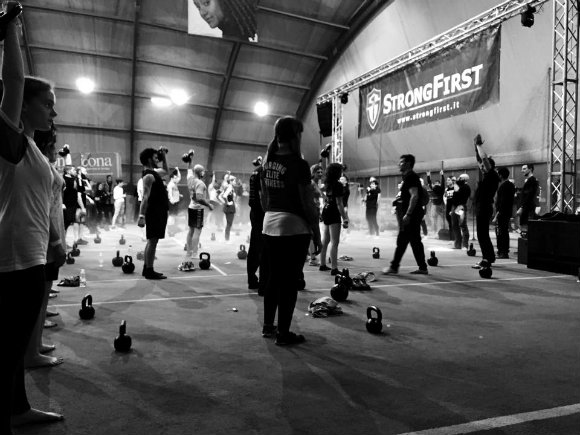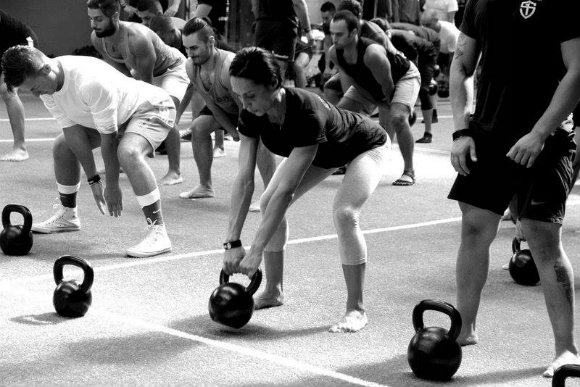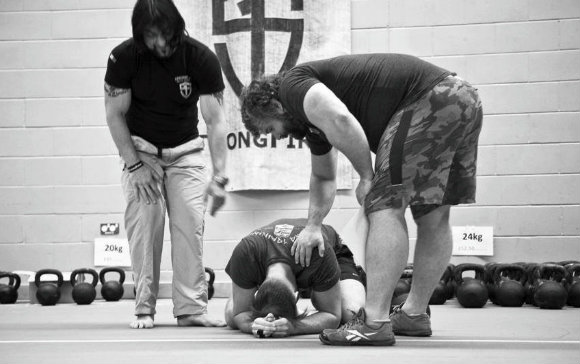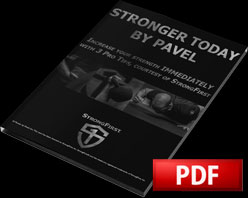As I work and observe the broad range of personalities and athleticism at my school, Five Points Academy here in New York City, I’ve come to view strength training as something like an iceberg. There’s the part you see above the surface — the sweat, the occasional cussing — and then there’s everything else.
It was ruminating on the “everything else” that led me to writing this column. What comes next is probably old news to anyone with a sport psychology background, but it was a revelation to me, and I think it will have value to those of us who are StrongFirst, as we strive to distinguish ourselves from the hordes of “trainers” littering the landscape of our industry.
The Iceberg That Is “Becoming Strong”
The brute practice of strength is only the most obvious, visible part of the “iceberg.” There is also a philosophical component to strength work, and a psychological one, as well. We get some of the philosophy in the StrongFirst instructor literature. We aren’t just trainers — we are “students of strength,” “brought together by the conviction that strength has a greater purpose,” because “it is strength that makes all other values possible.” That’s pretty hard to argue with (it’s also kinda beautiful), and it’s a big part of why StrongFirst instructors are so good at what we do.
In keeping with that greater-purpose mindset, it’s also important for us to recognize that the obstacles our students may encounter on the path toward strength aren’t always physical. That’s where the psychological part of the equation comes in. It’s the underside of the iceberg, and it encompasses a lot more than someone dreading the SFG snatch test, or feeling their heart sink when they contemplate grind-pressing the Beast.
 Becoming Strong Means Becoming Visible
Becoming Strong Means Becoming Visible
Consider this: weakness is simple. It’s like being broke. If you’re weak — or broke — no matter what the question is, the answer is probably “no.” Strength — like wealth — is more complicated, because having more strength (or money) than other people means things are now expected of you. Because you’re capable. And you’re visible.
On the surface that might all seem positive — and it is, mostly — but it’s not necessarily comforting. Being invisible is hard — crushingly hard — but being visible can be tough, as well.
In 2013, I worked closely and at length with a female student whose goal was to do a gut-renovation of her body — fifty-plus pound weight loss with composition overhaul, strength and mobility work, endurance — the whole bit. She was fed up with the status quo, and at the age of forty, the time had come.
Thanks to her own truly fierce spirit, some powerful career-related motivation, and a little StrongFirst iron dharma, she achieved her goal and then some. She looks incredible, moves with grace, and is strong as hell — which is good, because now she’s out here in the jungle, face-to-face with all the animals whose eyes passed right over her in her former incarnation.
After several years of mostly self-imposed single-dom, she’s using some of her newly-accessed fortitude to date again — and also to cope with an almost-daily splatter of comments and catcalls from random dudes on the street. Now that she’s back in the fight, she’s finding that, well, she has to fight. My friend is a badass, and she’s definitely game for it — but not everyone is.
 Weakness Is Familiar and Comfortable
Weakness Is Familiar and Comfortable
So the process of getting strong isn’t always a purely physical project, and it isn’t always a straightforward, joyful experience. Sometimes, stuff comes up. Especially with a modality as fast and effective as kettlebell training, it’s possible for a person’s physical development to outrun their ability to anticipate the personal and social ramifications.
Like being seen after years of invisibility, suddenly being regarded as capable can be downright alarming. It can force an unexpected reassessment of boundaries and priorities, and cause friction in personal relationships. Disappearing back into weakness and low expectations may seem safer and more comfortable by comparison. Certainly those things are more familiar — and the familiar is powerfully attractive.
Sometimes, the lure of safety and familiarity has the potential to stop a whole program dead in its tracks. I think everyone has that one student who comes in week after week, and always grabs the same weight, despite our best efforts to encourage him or her to take the next step. It’s tempting to write this off as laziness, or to blame the person for having a hamster-wheel workout mentality and not understanding that training by definition involves progression.
And true, it may very well be laziness, or the person just wanting to put in their 45 minutes so they can go home and watch Netflix without guilt. But there’s another possibility that a smart coach who truly cares should consider, and that’s the possibility that this student is in some way invested in weakness. (If “weakness” seems too judgmental a term, we might say “invested in non-strength.”) This may not seem to have much of anything to do with the work that’s happening in the gym — at least not at first. But again, that’s the iceberg.
I think we all agree that serious strength work can transform your life. But transformation is by its nature a violent act. In order to be rebuilt, things get torn down — and that’s a big deal, whether you’re talking about a nation, a building, or a person. When you get some weird, semi-passive push-back from a student, perhaps ask yourself what comfort they take in being not-strong — however counter-intuitive the idea may seem to you as strong person.
Put yourself in their shoes, and pay attention to the things they share with you. If they’re coming from a place of personal inertia and weakness, as they start getting stronger, tension may be generated — and not just in their anterior chain, maybe at home too.
Consider the sad fact that some guys aren’t keen on the idea of their wife or girlfriend being as strong as they are (or stronger) — and that plenty of women sabotage their training in deference to that. Or, if a student knows for a fact that he can now lift x-number of kilos, the notion may arise that maybe he can do other stuff he never considered before. Maybe he could ask that girl out — finally — or demand a raise, or take control of his diet and quit eating whole pizzas at midnight.
Strength opens doors, which is pretty great, but also a little scary, depending on what’s behind them. Maybe so scary that a student decides they’re not sure about this whole training thing after all. Maybe they’ll stick to swinging that lousy 20kg bell forever instead of grabbing the 24, or the 28. Or maybe they’ll skip tomorrow’s session entirely, and spend the money they were going to pay you on something else. Something easier.
 Our Role and Duty as StrongFirst Instructors
Our Role and Duty as StrongFirst Instructors
As coaches, we need to acknowledge this potential side-effect of strength work and be ready for it. As our students train, they’re gonna feel stuff — and it’s not necessarily going to be all shiny-happy Oprah-moments.
As progress is made, maybe a student will be angry, even furious, with themselves for wasting so many years on the sofa. It’s a wonderful thing to crush a personal record, but right behind that rush of pride may come a sudden, bitter aftertaste: “Why the hell didn’t I do this sooner?” or “Ugh, I still have so far to go!”
When we encounter these reactions, we don’t have to become therapists — and we shouldn’t attempt to, any more than we should attempt to diagnose our students’ hypertension or prescribe them medications — it’s not our function. But what we can do, and should do, is acknowledge what our student is experiencing, and validate it.
That means caring enough to consider whether what looks to us like “laziness” might in fact be something more complex. It means taking into account the pressures that may come to bear in a student’s life, and being mindful of the impact your work together might have outside of the gym. It means striving to be more than a stopwatch with a pulse, counting reps in between Instagram updates.
Admittedly, coaching usually isn’t quite this complicated. Most people don’t get an attack of the feels every time they step inside the gym. They don’t execute a gorgeous get-up and burst into tears. They just want to look better naked or be able to chase their kids around without getting winded. Simple as that.
Nevertheless, it pays to be aware that gaining mastery over one’s body has powerful implications — even if they’re not consciously realized. And a smart, tuned-in coach will consider that as they’re working to motivate and encourage their students toward that “greater purpose.”






Beautiful. Just beautiful. This one has completely set off the “EUREKA” alarm in my head. It’s that ah-hah moment of illumination. This one will be shared with the StrongFirst Korea community.
This post is stellar. A work of true compassion. It takes a great deal of hard work and talent to distill what we collectively know intuitively into such a concrete and articulate piece.
Hannah – I congratulate you. This elevates the discourse.
I spend a great deal of my time training and teaching others. I rely on many of the best teachers to inform this practice. This piece becomes a reference work for me immediately whether training the get-up or anything else.
This – “what we can do, and should do, is acknowledge what our student is experiencing, and validate it.” – Outstanding
Bottom Line – “Nobody cares how much you know until they know how much you care” – Theodore Roosevelt
Once Again – Game-changing. This rightly becomes a must-read for certification.
What a beautifully magnificent post! I’ve spent many years in the counseling profession and moving more into success coaching, I can tell you that your observations are more astute and practical than those of many of my peers.
I love this article! The more I think about it, the more it makes me think. 🙂 Looking forward to more of your contributions.
If this is the result of procrastination – by all means, do procrastinate:)
It’s funny… because to me the issue I have is that I will always be invisible and will always have to prove myself! No matter how strong I get I’ll always be a tiny 4’11”. A couple of months back we did our tac ops refresher at work. One of the things we had to do was break out of wrist grabs. We all stood around in a circle and one person would be in the centre with their eyes closed. The instructor would select a person to grab them by the wrist and they’d have to break out (and open their eyes). In one case I grabbed a guy’s wrist, he pulled to get out, opened his eyes, saw it was me and said “Shit you’re strong!” in shock. The sad thing is… he wouldn’t have responded that way to anyone else there, just me. The instructor even gave me an extra test that no one else had because I have such small wrists and she worried I wouldn’t be able to break out of a wrist grab (to be fair, small wrists are a disadvantage, and mine are really tiny…). She picked the biggest guy there to grab my wrists to see if I could break out. She didn’t do it to either of the other women there…(or any of the men, even those who weren’t all that proficient in other aspects).
As it is, I’m not all THAT strong yet, and still have a way to go. I can probably lift more than most women (who don’t lift or who don’t lift heavy enough), but I’m not ready to be a competitive powerlifter (and I’m currently on hiatus as I broke my leg, so I’ve got some months of work to just get back to normal), but I can’t ever foresee a time when I’ll not have to “prove” my worth as a strong person because it’s not visible to the casual observer. I have more fears that people will look at me and laugh when I want to progress into emergency response at work because at the moment there are no female members of the team and I’d have to compete against big, strong guys… and I look like the last person you’d choose for the job.
You started this piece by stating that there was probably nothing that you could write or say that hasn’t already been done better by the other cadre here. What you have written is profound, original, and best of all: true.
Well done.
A beautiful and compassionate piece. Thank you. The path to strength is a path to healing, and it has so many muddy byways that can be ignored or despised. Offhand, I can think of a dozen clients with whom I will be sharing this post. I look forward to reading your future pieces.
thats was an absolute amazing read thank you very much and thank you strongfirst.
This is really fantastic, thank you for getting it, and for putting it out there for others. There are so many layers to the onion.
Hannah,
Thank you for your insights! What is under the surface is so important: physical strength demands mental and emotional strength to support it. I am learning to recognize how my own emotional state affects (and often interferes with) my physical performance. So many messages swimming around in my head. When I can quiet them, I am strong. Thank you for recognizing what often goes unnoticed.
This is one of the best articles I’ve read on SF, and I think every coach, trainer, and other health professionals should read this because it is based on first hand experience and not just ideological conjecture. Well done, I look forward to more articles by you.
Thank-you Hannah, your insights were worth the wait. Some deep Jedi magic in here.
So many great Little Gems in this article. Thank you Hannah. You have a beautiful way of putting things so simpily.
I’ll be sharing this for sure.
Thank you again
Matt
Hannah, what a striking message. I found myself gasping at the realization that a close family member, whom I train periodically, has received much less from my part because of the awareness you just made possible. Thank you very much and congratulations on such a powerful first article.
In a sense, I think you’ve picked up on the mind aspect of martial arts – as your bio shows – like few people do. When we strive to be greater at anything, we must not forget the inner changes that come with it.
Parabéns.
I never considered that. Great read. Thanks!